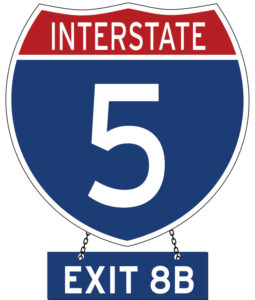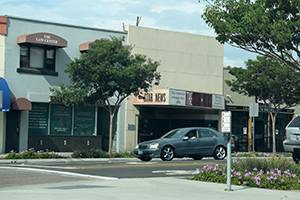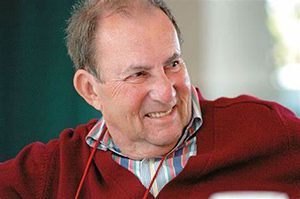Schlepping and Schmoozing Along the Interstate 5, Chapter 13, Exit 8B (E Street): Star-News
Proceed east from E Street exit to 3rd Avenue, turn right, Star-News building, at 296 3rd Avenue, will be on the right, before F Street.

 CHULA VISTA — Lowell Blankfort, a liberal Jewish Democrat, became co-publisher and editor of the staid, very conservative Star-News in 1961, and immediately began to shake up the old order. In his very first editorial, he announced that the community newspaper no longer would run columns by U.S. Rep. James Utt. Blankfort explained that Utt’s “so-called ‘column’ from Washington, or weekly political diatribe, is being dropped, pronto. Mr. Utt is the Republican Congressman from Santa Ana who, due to some deft GOP gerrymandering 10 years ago, also has been foisted on National City and Bonita.” Blankfort specifically objected to Utt being “against a minimum wage, against a politically independent Supreme Court, against labor, against the income tax, against adequate pay for postal employees, against the United Nations, against the separation of church and state, against (verbally) the so-called ‘Reds.’”
CHULA VISTA — Lowell Blankfort, a liberal Jewish Democrat, became co-publisher and editor of the staid, very conservative Star-News in 1961, and immediately began to shake up the old order. In his very first editorial, he announced that the community newspaper no longer would run columns by U.S. Rep. James Utt. Blankfort explained that Utt’s “so-called ‘column’ from Washington, or weekly political diatribe, is being dropped, pronto. Mr. Utt is the Republican Congressman from Santa Ana who, due to some deft GOP gerrymandering 10 years ago, also has been foisted on National City and Bonita.” Blankfort specifically objected to Utt being “against a minimum wage, against a politically independent Supreme Court, against labor, against the income tax, against adequate pay for postal employees, against the United Nations, against the separation of church and state, against (verbally) the so-called ‘Reds.’”

From 1954 to 1959, Blankfort had published the Pacifica Tribune, which successfully campaigned for the incorporation of Pacifica, California, south of San Francisco. Based on that experience, a bank was willing to loan Blankfort and his business partner Rowland Rebele $50,000, which they matched with $25,000 contributions each. Then they persuaded Blanche Coyle, widow of the previous publisher Ray Coyle, to let them gradually pay her the remaining $400,000 of the $500,000 sale price. They retained ownership of the now feisty newspaper until 1973, when they sold it for $3.8 million. Blankfort continued to work as editor-in-chief for the new conservative owners until 1978, when they fired him for being far too liberal for their tastes.

(Photo compliments of Paradise Post)
In the interim as Blankfort commented to an oral historian at Rutgers University, his alma mater, he served “a very conservative community and I ran a very liberal paper and made lots of money doing so. It was a good paper… it covered the town … We did in-depth articles on what was going on in the community. We exposed a school board member, who was a builder, who had some earth taken off the school property and used it as topsoil on one of his developments.”
Furthermore, “I would crusade for environmental protection and against developers, greedy developers, who took big ads in my newspapers – sort of biting the hand that feeds me… I campaigned against the war in Vietnam,” having visited that country during a lifetime of extensive travels overseas in which he visited and wrote about more than 100 countries. Critics called his newspaper “The Red Star.”
Born April 29, 1926, to Herbert Blankfort and Gertrude Goldwater Blankfort, Lowell told a Rutgers interviewer that growing up in Manhattan’s “Golden Ghetto” along Central Park West, he was a “spoiled, only child, and that’s why I love to be interviewed. I like the attention (laughter). That’s why I write the kind of editorials I do (laughter). I get a lot of attention, you know.”
His mother, a liberal who was an early member of the United World Federalists and a supporter of the United Nations, divorced his father, a ‘big flag-waving patriot, MacArthur type, right wing” when Blankfort was nine years old, occasioning a trip for Lowell and his mother to Reno, Nevada, where divorces could be obtained without all the rigamarole required by the State of New York. Lowell clearly was more influenced in his political views by his mother than by his father.
One of the celebrities who lived in the same apartment building that they did was New York Yankee slugger Babe Ruth, whom Blankfort met while riding up in the same elevator. Then an elementary school student, he precociously asked the Sultan of Swat if he could interview him, and Ruth agreed, saying “Sure, kid, come on up!” according to a story told to the Paradise Post by Blankfort’s second wife and widow, April Blankfort, in 2015.
In fifth and sixth grades, Blankfort and future author Martin Mayer (Madison Avenue, U.S.A.; Wall Street: Men and Money; The Schools; The Lawyers; About Television and others) co-published a mimeographed newspaper at their elementary school, and successfully solicited advertising from the stores where their parents shopped.
While at Rutgers University, Blankfort served as a campus stringer for the Associated Press and its rival United Press International, as well as for The New York Times, and newspapers in Philadelphia and New Brunswick. Covering sports contests, he would rewrite the lead of his story for each news outlet to conceal the fact that he was writing for all of them. One time, he recalled, after he sent a sports story to The Times, an editor asked what took him so long, seeing that AP had already moved a similar piece over the wire.
After college, Blankfort worked for a series of small-town newspapers, wrote freelance articles for bigger ones, and eventually moved to Europe, where he wrote for such publications as the Daily Mail and Stars and Stripes. Returning to New York, he became a copy editor for The Wall Street Journal and wrote also for a short-lived magazine called Quick. Then he heard of an opportunity to purchase a newspaper in Sharp Park, a community of what would become Paradise, California. He sold it five years later for a profit and went on an around the world trip with his first wife, Alice.
Two years later the opportunity to purchase the Star News presented itself. In its 2015 obituary of Blankfort, The San Diego Union-Tribune noted that Wadie P. Deddeh, a Chaldean immigrant who had been a faculty member at Southwestern College, attributed his successful entrée into politics to the support that he received from Blankfort’s newspaper. “Lowell immediately told me, ‘I have your back.’ He supported me. I stood for the same things he believed in – freedom of thought, freedom of religion – and without the good copy he gave me week after week, I would have had a very hard time winning that first election. I’m grateful to him from here to eternity.”
(Deddeh was elected to the state Assembly, and later to the state Senate, becoming acknowledged as an expert on transportation. The CalTrans Building in San Diego is named for him. Deddeh’s career ended with an unsuccessful run for Congress, when he was bested in the primary election by Bob Filner, who was then a San Diego City Councilman.)
Blankfort followed in his mother’s footsteps serving as president of a San Diego chapter of the World Federalist Association, as a director of the International Center for Development Policy, and as treasurer of the San Diego World Affairs Council.
When Blankfort and the Star News parted company, it was far from the end of his newspaper career. He eventually purchased 15 small newspapers in Colorado and California, writing a weekly column on international affairs for them. One with which he became identified was the Paradise Post, located in the town of Paradise in Butte County in California’s Sierra-Nevada foothills.
A later editor of that newspaper, Linda Valine, wrote a remembrance in 2015, the year Blankfort died. Her son, she said, had been a Navy SEAL, whose political views were diametrically opposed to those of Blankfort’s. Yet the young man and Blankfort got along well, their verbal disagreements never lessening their respect for each other. In fact, Blankfort helped young Valine to start a non-profit organization for disabled athletes, the Virginia Beach Hockey Sled Team, on which paralyzed athletes sled around the ice while playing hockey. Blankfort wrote the business plan and donated $10,000 to get the organization started.
*
Next Sunday, April 3, 2022: Exit 10 (Mile of Cars Way):Ford Motor Company
*
This story is copyrighted (c) 2022 by Donald H. Harrison, editor emeritus of San Diego Jewish World. He may be contacted via donald.harrison@sdjewishworld.com